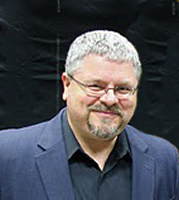You’d have to be mighty jaded not to be impressed with the work of the Philharmonic Association, with its mission “to provide an opportunity for young musicians to learn, understand, and perform all genres of great classical and jazz music…” For twenty-six years such noble efforts have been powerfully aided by “an incredible family of musicians and parents who have been involved in the Philharmonic Association.”
Artistic Director Hugh Partridge brought on the first (and most “senior”) of the three groups that would constitute an extended weekend of orchestral excellence. Sixteen of these Triangle Youth Philharmonic players were honored for their perfect attendance, a palpable indicator of dedication. This exceptional ensemble enhanced a bracing Sunday afternoon for the enthusiastic audience in Meymandi Concert Hall. (The two younger groups would perform in that same venue on the following Tuesday evening.)
All the string players having filed off the stage, Assistant Conductor Rashad Denzell Hayward led the reduced forces in the opening English Dances, Suite No. 1, by Malcolm Arnold. While the slow movements were a bit tepid, Hayward brought the lively Vivace and vigorous Allegro risoluto to an apex of action, reminiscent of Vaughan Williams’s famed English Folk Song Suite.
A veritable game of musical chairs ensued. The strings filed back on as the others departed, setting the stage for the unearthly “Threnody” of Krzysztof Penderecki. The piece is typically dedicated “To the Victims of Hiroshima,” but there seems to be little evidence that the composer had Hiroshima in mind. Still, it works in such a setting, an unmusical depiction of the indescribable. As well as one could discern, the players here were at their finest, eliciting unnatural acts from the instruments. Partridge warned the audience that here was a piece they probably had not heard before and might not want to hear again! Perhaps one could express Partridge’s quip with a more positive first-person spin, say, “This work was most satisfying; I have heard it once, and I’m satisfied.”
Ernest Bloch’s “Nigun” section from his Baal Shem suite did not greatly lighten the heavy mood, but this arrangement for violin and orchestra did deliver music of most sublime character. It is not clear whether Bloch meant this piece as a generic “Cry to God” or for it to call attention to specific Jewish suffering. Whatever its provenance, though, the full forces of the orchestra imbued it with a somber allure. And Assistant Concertmaster Samuel Zhu’s solo work showed the perceptive touch that one might expect of a “veteran” violinist twice his age.
Speaking of that certain veteran touch, that is just what the audience could perceive from this group of decidedly non-veterans in the closing ballet, The Firebird, by Stravinsky. There seemed little to choose between them and any similar musical group of their elders. They gave this great workhorse number its due from the introduction of the familiar theme to the dispatching of the bad king (Danse infernale), and on through the rousing anticipated Finale.
**********
April 28, 2015 – The rookie team players are called the Triangle Youth Orchestra, a group whose perfect attendance count was no less than 28. As soon as Assistant Conductor Jake Winger launched them into Handel’s stately Royal Fireworks Overture, it was evident that these young musicians were about serious business. The other numbers were led by Conductor Tim Kohring, beginning with a large-orchestra arrangement of the Allegro con brio movement from Mozart’s Symphony No. 25, a performance exhibiting all the vivacity one expects from this familiar work.
Kohring explained that Elliot Del Borgo had composed “Essay for Orchestra” specifically for beginning players. The romantic piece worked wonderfully well, giving every section of the orchestra its own big moment, perhaps the group’s best work of the evening. These youngsters closed their most delightful offerings by revisiting The Firebird and its Finale.
The Triangle Youth Symphony won the perfect attendance sweepstakes with 35. This “intermediate” group did superior work on four ambitious and standard selections. With Conductor McCrae Hardy, they set the pace with Beethoven’s Egmont Overture, maintaining the distinctive drive of that composer’s work. If you were partial to the aforementioned Vaughan Williams English Folk Song Suite, you would probably have liked this version. Arranged for orchestra by Gordon Jacob, a noted composer in his own right, the three movements projected all the rousing martial qualities of the original military band version.
That classic British music, as Hardy noted, was succeeded by a characteristic American selection. The “Variations on a Shaker Melody” from Copland’s Appalachian Spring constituted many elegant and Simple Gifts to the spirited audience. The evening ended on a Slavonic note with the Allegro con brio movement from Dvořàk’s Symphony No. 8, Op. 88.
Given the talent and dedication exhibited on this particular evening, the Philharmonic Association should have little trouble backfilling for the twenty-two graduating seniors that will have “aged out” of the premier ensemble.











